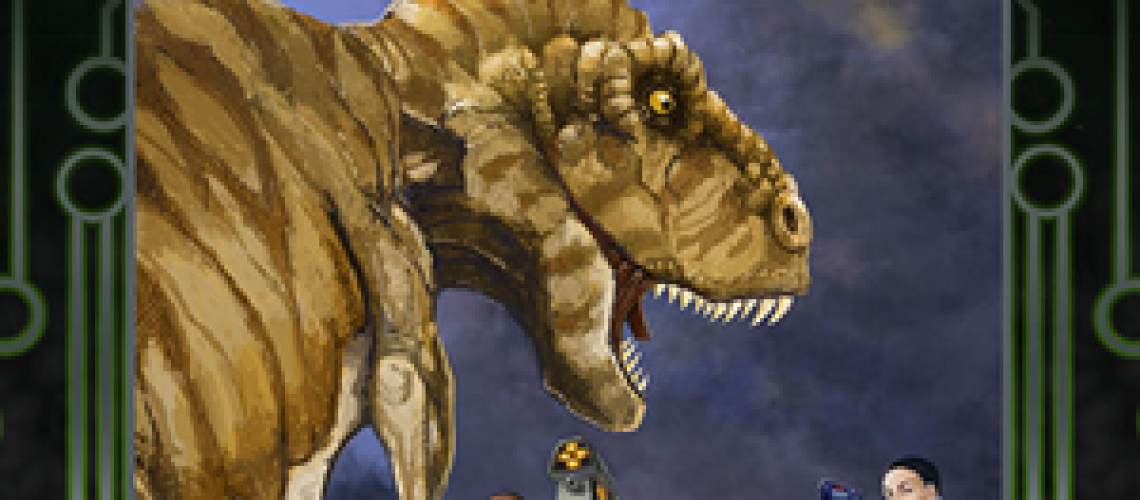“History is not written by the victors, it’s written by the people with the time machines.” — Robin D. Laws
Time Travel, as one of the earliest streams of science fiction literature, is similarly one of the earliest themes and modes in roleplaying games. From Timemaster to GURPS, to Continuum, and many others, characters acting as adventurers, patrollers, and explorers in the corridors of time and space have been a staple of science fiction roleplaying. Timewatch, written by Kevin Kulp and published by Pelgrane Press, is the latest iteration of time-travel roleplaying games.
The default setting of the Timewatch RPG is the familiar line of a Time Patrol who monitors and keeps History on track. The Timewatch have a citadel in the out-of-time-and-space locale just before the singularity event that creates the Big Bang, and it is from that point that they monitor changes to the time stream due to outside agency, and then when one is detected, the agents are dispatched to discover why history has gone off track, and to correct it. Time’s track goes off because of, not usually pure chance as in the matter of Voyagers!, but rather because of other time travelers. Thus the players are pitted against would-be meddlers in history ranging from misguided do-gooders looking to kill Hitler to mutant time-traveling intelligent cockroaches seeking to create the nuclear apocalypse that will bring their species into existence. The opposition wants to change history permanently, and it’s up to the PCs to foil their plans and fix it.

The game does provide some alternative frames. Want to be 1930s-era adventurers fighting Lovecraftian baddies across space and time, not just in contemporary Arkham? Want to run a Bill and Ted’s Excellent Adventure sort of light time-travel hijinks game? Or even run a Sliders-style parallel realities game? The book provides guidelines on running all of these kinds of games, and more.
The mechanical engine of the Timewatch Roleplaying Game is the Gumshoe investigative roleplaying game invented by Robin D. Laws (and featured in games like Trail of Cthulhu, Ashen Stars and Mutant City Blues). Characters have investigative abilities, such as research, knowledge of history, and knowledge of temporal science, as well as non-investigative abilities, such as Athletics and Shooting. While using non-investigative abilities requires a die roll (such as shooting at the rogue time traveler ready to assassinate Nixon), the use of investigative abilities uses an assumed-to-be-competent framework backed up by a points system for extra rewards. Thus, the agent studying the chemical lab who is versed in science is going to find the crucial clue if they look, that the lab was preparing nitroglycerin. This means that the GM’s role is not making players make rolls to find clues, but rather to create a series of clues and scenes so that the players can piece that information together and solve the mystery. It’s a system that allows the GM not to be worried that the player isn’t going to remember that the Taira lost the Genpei War or that a couple of bad rolls means that the investigation gets stalled at the mad scientist’s lab.
I was disappointed that the book lacked a staple of roleplaying books of this time — a reading list. While a lot of people who might be interested in picking up and running and playing Timewatch have cut their teeth on time-travel novels and stories, having a reading list of inspirations for the game would have been helpful and useful. Even in the age of Google and the Internet, having readers pointed toward time-travel book authors like Poul Anderson, Kage Baker, H. Beam Piper and Jack Williamson would be most valuable. The book DOES have a section on some interesting historical characters to throw into your games that you may or may not be familiar with, ranging from Theodore Roosevelt to Empress Wu Zetian.
Timewatch is a roleplaying game for the crunchy investigative gamer set, then, best suited for players who want to, in the words of Quantum Leap, “put right what once went wrong”. If the idea of your being a Timewatch agent going back to 300 BC Rome to find out why the Roman Empire never rose, or untangling a conspiracy to have the descendants of Genghis Khan rule the world, or just finding out who anachronistically stole the Mona Lisa and replaced it with a child’s watercolor in 2004, sounds intriguing, then Timewatch may well be for you. Time will tell.







